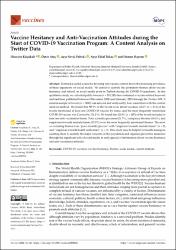Vaccine hesitancy and anti-vaccination attitudes during the start of COVID-19 vaccination program: A content analysis on twitter data

Göster/
Erişim
info:eu-repo/semantics/openAccessAttribution 4.0 Internationalhttps://creativecommons.org/licenses/by/4.0/Tarih
2022Üst veri
Tüm öğe kaydını gösterKünye
Küçükali, H., Ataç, Ö., Palteki, A. S., Tokaç, A. Z. ve Hayran, O. (2022). Vaccine hesitancy and anti-vaccination attitudes during the start of COVID-19 vaccination program: A content analysis on twitter data. Vaccines, 10(2). https://doi.org/10.3390/vaccines10020161Özet
Twitter is a useful source for detecting anti-vaccine content due to the increasing prevalence of these arguments on social media. We aimed to identify the prominent themes about vaccine hesitancy and refusal on social media posts in Turkish during the COVID-19 pandemic. In this qualitative study, we collected public tweets (n = 551,245) that contained a vaccine-related keyword and had been published between 9 December 2020 and 8 January 2021 through the Twitter API. A random sample of tweets (n = 1041) was selected and analyzed by four researchers with the content analysis method. We found that 90.5% of the tweets were about vaccines, 22.6% (n = 213) of the tweets mentioned at least one COVID-19 vaccine by name, and the most frequently mentioned COVID-19 vaccine was CoronaVac (51.2%). We found that 22.0% (n = 207) of the tweets included at least one anti-vaccination theme. Poor scientific processes (21.7%), conspiracy theories (16.4%), and suspicions towards manufacturers (15.5%) were the most frequently mentioned themes. The most co-occurring themes were "poor scientific process" with "suspicion towards manufacturers" (n = 9), and "suspicion towards health authorities" (n = 5). This study may be helpful for health managers, assisting them to identify the major concerns of the population and organize preventive measures through the significant role of social media in early spread of information about vaccine hesitancy and anti-vaccination attitudes.
WoS Q Kategorisi
Q2Scopus Q Kategorisi
Q1Kaynak
VaccinesCilt
10Sayı
2Koleksiyonlar
- Makale Koleksiyonu [3777]
- PubMed İndeksli Yayınlar Koleksiyonu [4230]
- Scopus İndeksli Yayınlar Koleksiyonu [6574]
- WoS İndeksli Yayınlar Koleksiyonu [6631]
İlgili Öğeler
Başlık, yazar, küratör ve konuya göre gösterilen ilgili öğeler.
-
COVID-19 vaccination can occasionally trigger autoimmune phenomena, probably via inducing age-associated B cells
Mahroum, Naim; Shoenfeld, Yehuda (Wiley, 2022)The increasing numbers of vaccinated people against COVID-19 worldwide has permitted better visualization and understanding of possible adverse effects, particularly those related to autoimmune phenomena. In this ... -
COVID-19 vaccination and the rate of immune and autoimmune adverse events following immunization: Insights from a narrative literature review
Mahroum, Naim; Lavine, Noy; Ohayon, Aviran; Seida, Ravend; Alwani, Abdulkarim; Alrais, Mahmoud; Zoubi, Magdi; Bragazzi, Nicola Luigi (Frontiers Media S.A., 2022)Despite their proven efficacy and huge contribution to the health of humankind, vaccines continue to be a source of concern for some individuals around the world. Vaccinations against COVID-19 increased the number of ... -
Comparison of immunogenicity and reactogenicity of inactivated SARS-CoV-2 vaccine (CoronaVac) in previously SARS-CoV-2 infected and uninfected health care workers
Soysal, Ahmet; Gönüllü, Erdem; Karabayır, Nalan; Alan, Servet; Atıcı, Serkan; Yıldız, İsmail; Engin, Havva; Çivilibal, Mahmut; Karaböcüoğlu, Metin (Taylor and Francis Ltd., 2021)The effects of inactivated SARS-CoV-2 vaccine (CoronaVac) on previously naturally infected individuals are unknown. This study compared immunogenicity and reactogenicity of CoronaVac in once naturally infected health-care ...


















